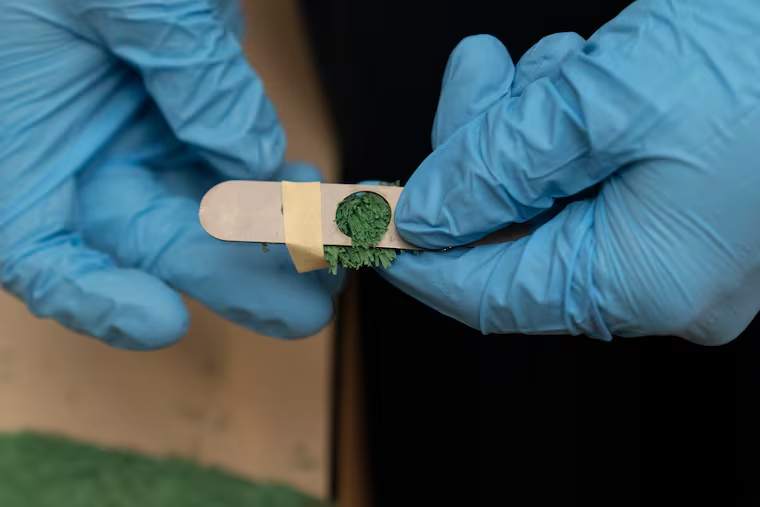How we were able to test artificial turf from Veterans Stadium and what the tests showed
Inquirer reporters bought souvenir samples of the old Veterans Stadium turf on eBay and had them tested.

In 2022, David West became the sixth former member of the Philadelphia Phillies to die from brain cancer. His death, coupled with growing scientific concern about the perils of PFAS, gave Inquirer reporters the idea to explore whether the artificial turf at Veterans Stadium had contained harmful chemicals.
But how? The stadium, after all, was razed in 2004. Fortunately, in 1982, the Phillies had presented fans with a unique giveaway item: pieces of AstroTurf that had been on the Vet’s field between 1977 and 1981. The team had sealed thousands of 4-inch squares of the fake green grass in plastic, and labeled it the “Official Turf of Champions.”
» READ MORE: Artificial turf was once touted as a ‘magic carpet.’ Here’s the timeline of its tangled past.
Reporters purchased these turf samples from four individual sellers on eBay, and had two pieces tested at the Lancaster, Pa., laboratory of Eurofins Scientific, an international group of 900 labs in 50 countries, and two samples at a lab at the University of Notre Dame.
Eurofins tested the 40-plus-year-old Vet turf for 70 different PFAS compounds. Sixteen were found. Two of those 16 were perfluorooctanoic acid (PFOA) and perfluorooctane sulfonic acid (PFOS), the most widely studied of the chemicals and considered the most perilous, and the subject of lawsuits across the country.
Concentrations of PFOS and PFOA in the Vet samples were 5.4 and 12 parts per trillion.
» READ MORE: Six former Phillies died from the same brain cancer. We tested the Vet’s turf and found dangerous chemicals.
Although these levels of contamination in drinking water would be alarming, less is known about the potential danger of playing on artificial turf where the toxic chemicals are inhaled or transmitted through chronic skin contact. Even so, several toxicologists who are conducting extensive PFAS studies said the Vet turf findings were concerning and problematic.
The Synthetic Turf Council, an industry group, said “the materials used in synthetic turf have been thoroughly reviewed by both federal and state government agencies and are considered to be non-hazardous.” Asked twice by email if the turf contained PFAS, the president of the council did not answer the question.
The known health risks of PFAS are associated with various types of cancer, liver damage, decreased fertility and immunity to fight infections, increased cholesterol levels, and risk of asthma and thyroid disease.
The Phillies consulted several brain cancer experts, who told the organization that there is no evidence of a link between artificial turf and the disease. Other experts, however, said the issue is worthy of additional study.
» READ MORE: What to know about ‘forever chemicals,’ artificial turf, Phillies cancer deaths, and our story